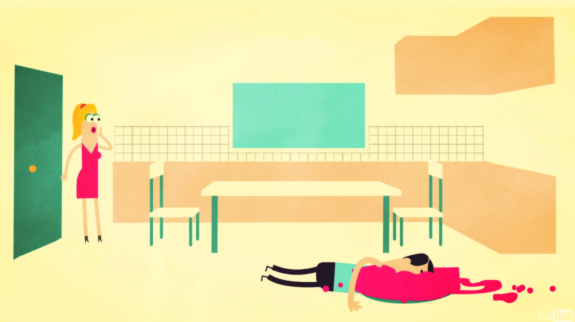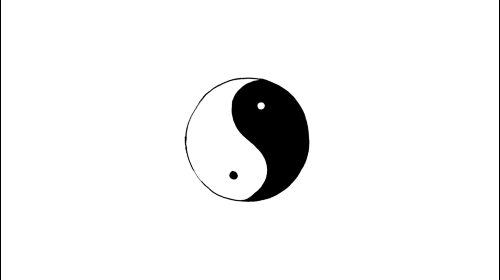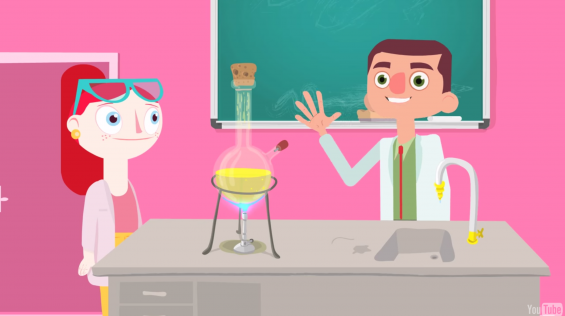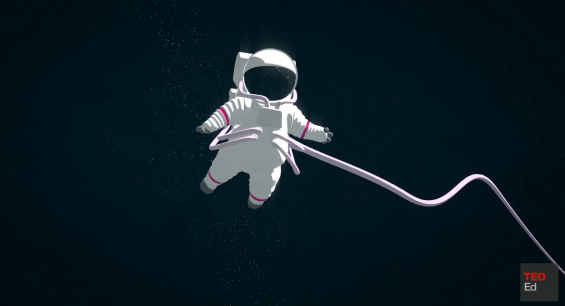
Is it actually ironic? 3 TED-Ed Lessons on irony

How many times have you heard the phrase “That’s so ironic,” and wondered, “Wait … is it?” The term is used a lot in our cultural vocabulary and often incorrectly. In response to this confusion, TED-Ed Educator Christopher Warner wanted to set the record straight: What is irony? How is it used in everyday language or as a dramatic device? Is rain on your wedding day truly ironic? And why is irony so prevalent and useful? Focusing on three types of irony (situational, dramatic, verbal), Christopher Warner pieces together what is truly ironic.
Situational irony: The opposite of what you think
Let’s begin with the basics: Something is ironic if and only if it is the exact opposite of what you would expect.
In on a secret? That’s dramatic irony
You’re in a movie theater, watching the new horror flick. The audience knows something that the main character does not. The audience sees the character’s actions are not in his best interest. What’s that feeling — the one that makes you want to shout at the screen? This widely used storytelling device is dramatic irony.
At face value, the lines between verbal irony, sarcasm, and compliments can be blurry. After all, the phrase ‘That looks nice’ could be all three depending on the circumstances. Verbal irony is used most often and most casually.




Excellent. The 3rd video is perfect to explain how parents, teachers etc… should absolutely not talk with children. The sarcasm is a verbal violence that we must just take out from our langage.
I agree with you, but partly. It is true that using irony when talking to kids is not a very good idea, since they do not own the ability to understand it and it may be misunderstood. But when we are referring to adults or even some mature teenagers, it is a little bit different.
Sarcasm might be aggressive, yes. Nevertheless, we can decide how much attitude we want to leave behind it. Devices such as sarcasm make our language richer. That is my point of view.
I disagree. Kids do understand irony and sarcasm. I now teach Pre-K, but even when I taught two and three year olds, they exhibited irony at times. In a lesson on animals, I explained that people are animals too. One of the children rolled his eyes and said, “Yeah, I’m a pig!”. The others gleefully joined in with “I’m a horse!”, “I’m a dog!”etc. I certainly would never use it to mock a child, but they can be more aware and attuned to adults’ speech than you would assume.
Well, I definitely made a mistake by saying kids do not understand it. You have a point there, but I did not want to mean exactly that. Kids are able to understand what irony is and know how to use it in their own situations and relations with others. However, what I really meant was that sometimes adults use a very subtle irony, which MAY be difficult to notice for a kid. I think they need to be talked clearly since we are trying to teach them everyday and every moment.
I completely disagree that children don’t have the ability to understand irony and sarcasm. When my daughter was as young as two years old, she understood it when she heard it, found it funny, and used it herself… appropriately, I might add. However, I have a sister-in-law, who’s a few years older than I am, that can’t recognize it that easily. So, that leads me to believe it’s a personality/sense of humor thing and has nothing at all to do with how old someone is.
I used irony and sarcasm for long time. I thought it was humour but I discovered that it could hurt and that was not what I wanted. I rely pay attention now when I use them.
I find sarcasm hilarious, especially among good friends. I guess the environment in which we grow up shapes whether we think of it as “verbal violence” or “poking fun”, as the video describes it.
Sarcasm has it’s limits. I find it to be an excuse for some that don’t have an intelligent comment so throw out what THEY think is funny. It gets very old.
Then, there’s the good friend that you know LOVES you and NEVER wants to hurt you, especially with words.
Example: I have a garden that is in terrible shape due to neglect and wind and laziness on my part. My friend was in town and hadn’t seen our home before and wandered outside and came back from the “garden” area.
I said, “Oh, did you see the garden?” She replied “THRIVING!!!!!!!”
It was hilarious because it was true and it DOES look terrible.
Just my thoughts…..
Teachers generally aren’t friends with the children, when I was in school teachers would use sarcasm to publicly demean children and their ideas. I don’t think that’s appropriate behaviour from any teacher.
You’re absolutely right. But why stop with just sarcasm? We could ban books with words we don’t like and require tape to cover the mouths of anyone whose opinions differ with our own!
Sorry. Just testing out my newfound knowledge.
This is great! There should be a TED-ED video for the overused word “literally”.
Absolutely!
I was literally thinking the same thing.
Literally this.
You’re welcome: http://m.youtube.com/watch?v=TZBn8-UUQeI
The overuse of “literally” was just explained – it’s a widespread use of verbal irony.
I agree. You literally ready my mind.
Literally.
literally
That is literally the best idea I’ve heard all day
I literally died of laughter when I read your comment …
Now, that is a misused of the word “literally”
is it ironic that TED is using kids cartoons to describe figures of speech to adults?
Yes, that should be situational irony.
Well no, they are not “children’s cartoons” because they were not directed towards children.
It’s ironic that your patient attempt to put people straight on the definition of ‘ironic’ is misconceived and will in all likelyhood make people misunderstand the true meaning of ‘ironic’.
A fundamental element of irony is that there must be an intent which is confounded, despite considerable effort being made to achieve the opposite result.
In the ‘cakewalk’ example, despite the chap’s cake-walking qualifications there would still these would only neutralise the expectation of a fall, not make it ‘the opposite’ of expectation. Therefore, even by your own definition, the fall and mess would not be ironic.
Now, had he insisted on helpers, training and a health and safety assessment, then slipped on the H&S forms, THAT would have been ironic.
Thank you! Somebody understands irony. The videos are a well meaning but Failed attempt at explaining irony.
How would you classify the following? Please ignore the erroneous attribution.
A post promoting serenity and positivity cites Virginia Woolf saying “there is no problem which a hot bath would not fix!”
Isn’t it multiply ironic given the fact that Virginia Woolf drowned herself?
Absolutely, its always after the fact when something is found. It happens with all the great ones; Twain, Poe, and that’s only mentionable few. Its hard to write in irony as a display of true irony, it is the readers that catch it inadvertently. And then, come to find out, its just a coincidence that’s a paradox; one of those things that is true, yet so mysterious that it cannot be explained.
Wrong, wrong, wrong.
Opposites, contrariness and sarcasm the traits of Hollywood comedies that just aren’t funny. This is not irony.
Imagine your son was scared of flying. He had to travel several hundred miles to get to university, so he took the train to avoid being killed in an aeroplane crash. He was killed when an aeroplane fell out of the sky and hit his train. That’s irony.
I suggest you watch Blackadder and get a master class on Irony, sarcasm and contrariness.
Ok that makes sense. I have a question though: does the plane have to hit the train in order for it to be irony? Wouldn’t it still be ironic that he took the train thinking it safer than flying only to later die in a train wreck? Maybe what you’re describing is double irony?
Consider this treatment for a screenplay: Your son gets on the train. There’s a freezing rain ice storm going on. They are de-icing planes at the airport, but the weather is so bad most pilots aren’t willing to fly. One seemingly over confident hotdog pilot decides to take off anyway. He’s flying the plane that is going to the city where your son is going to school — indeed this would be the flight your son would be on, if your son weren’t afraid of flying.
The train is now on its way, and your son looks at the horrible weather and is congratulating himself that he didn’t take a risk on flying under these conditions.
The pilot takes off. There is ice on the wings, and he’s having problems gaining altitude and maintaining control. Several times the plane seems to be diving uncontrollably and passengers are looking terrified. The plan passes the train, just a few feet overhead, traveling right along the train tracks, struggling to gain altitude. The pilot watches as his directional instruments and compass seem to be frozen as well. So he starts following the train tracks to stay on course. What else can go wrong?!
We see a crack developing along one wing. Suddenly, we hear a snap, and we watch as the huge piece falls off the plane and tumbles toward the ground.
But it turns out it is just a piece of the ice. The slab of ice hurtles to the ground, and the plane, now free from the extra weight starts climbing. The instruments start working, and the pilot is able to climb above the clouds and get to the destination airport on time. The plane and passengers now seem safe. Disaster averted!
But that slab of ice falls on a railroad switch. It hits the switch just a few moments before the train, still moving at top speed gets there. The switch diverts the train off the main track onto a short unmaintained siding. There is no time at that speed for the engineer to react, and the train runs off the end of the end of the siding, over a river embankment and then into a rapid river with chunks of ice floating by. The river is deep, the current swift, and everyone aboard, including your son dies.
When the pilot gets to his destination, he stops in the airport bar, and watches the news, while he he checks his voice mail. The first message is from his wife telling him, that she is sorry but because of the weather she couldn’t get to the airport before he left and didn’t get to give him a goodbye kiss on their anniversary. So, as a surprise, she is going to take the train and meet him in the destination city for a surprise second honeymoon celebration. She’s even booked the same room they celebrated their original honeymoon in and she will meet him there.
While he is listening to this message, the TV News is reporting on the train wreck. And he is in shock. As the first message ends, the phone says there is a 2nd message, this time from his daughter, and he’s dreading that she called to tell him that his wife’s body has been found.
But it is not, his daughter is calling to say that Mom missed the train, so she is driving.
That’s situational irony, and it’s dramatic, but is it dramatic irony? Since the audience didn’t know what was going to happen, probably not…
I think the third video misses out on two other types of verbal irony, namely hyperbole and understatement. They are also considered irony, as what is said is not exactly what is meant, but it’s not exactly the opposite either.
Two examples: “I have told you a million times already” would be hyperbole and “We’re in a little bit of trouble” when there’s actually a big trouble would be understatement.
Does someone else have more details on this?
I think it is disputable if hyperbole and understatement are a form of irony. For me, they’re not, even though they are contrasting with reality.
The term irony has its roots in the Greek comic character Eiron, a clever underdog who by his wit repeatedly triumphs over the boastful character Alazon. The Socratic irony of the Platonic dialogues derives from this comic origin.
What about post-irony?
Brilliant!
What this fails to grasp is that only north Americans have problems understanding irony or sarcasm.
The same nation(s) that have military bases all over the world, and yet the worst fundamental grasp of geography amongst first world states.
I think the second example in the situational irony video is not ironic, but it is agesist.
The problem is that expectations vary among different people, so you can’t universally say one thing is or isn’t ironic. It may be ironic to you but not to someone else because you had different expectations. Using the cake example, you may expect that a character in a sitcom carrying a precarious cake would inevitably drop it in a dramatic moment because you’ve watched enough sitcoms that feature similar scenes. So it may be ironic to you if the character doesn’t actually drop the cake. For even more irony, you could have another character conspire to have the cake dropped by giving it to the clumsiest character in the show and then that person ironically isn’t clumsy when carrying the cake, in direct contrast with the conspiring character’s expectation.
I wonder, what is the most ironic thing of all time?
What about the “Spinach Popeye Iron Decimal Point Error Myth” (SPIDES)? To find it you can just Google it.
The myth was used inadvertently, by expert skepticks who credulously believed it to be veracious, because they failed to check its provenance, as a most popular example of the need to check the accuracy of data before presenting it in order to prevent the creation and dissemination of fallacies and myths.
I suppose this is classed as “situational irony”. However, now that you know about it, if you see someone using the myth as though it is veracious, is that not also a type of “dramatic irony”?
cheese